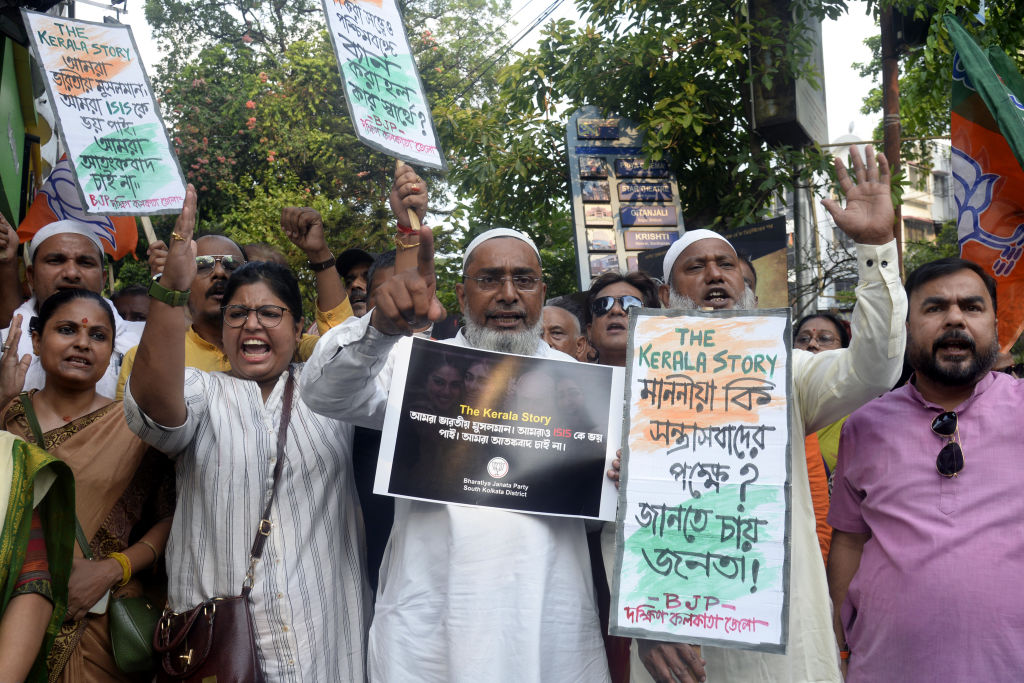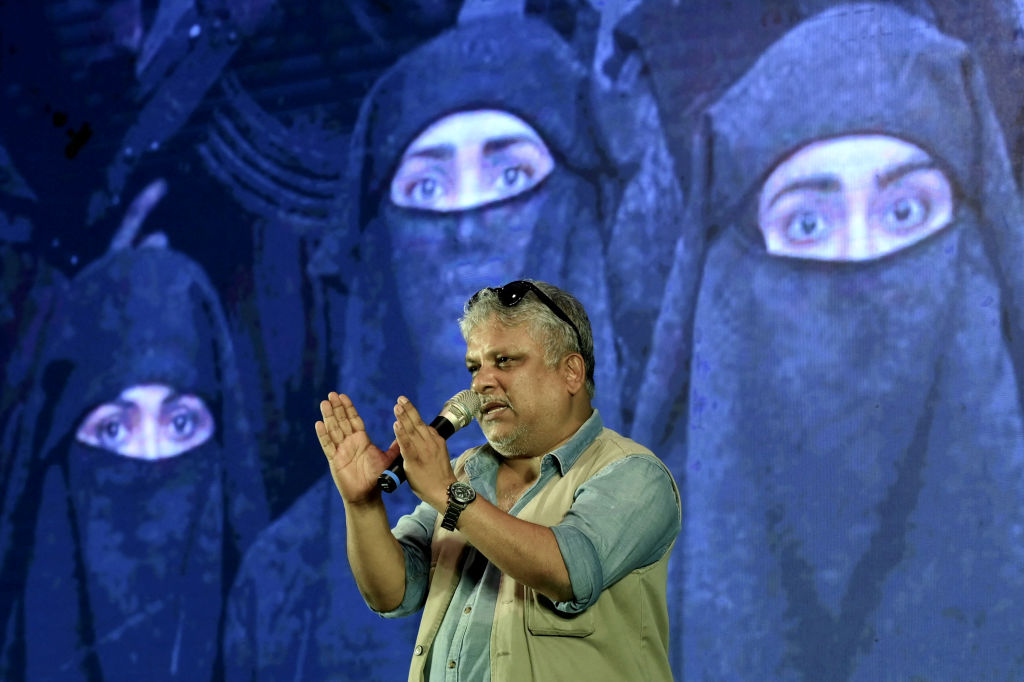
It was just another Saturday in Akola, a small city in the western Indian state of Maharashtra, when a heated argument on social media over a controversial film called The Kerala Story quickly escalated into deadly violence.
According to local reports, screenshots of the conversation, which was steeped in religious insults, quickly went viral. Within hours, a huge crowd marched to the police station to complain about hate speech while another began to pelt stones and vandalize homes and vehicles. The violence has led to the death of one man identified as 40-year-old named Vilas Gaikwad, while eight others were severely injured and hundreds more were arrested by the local police. The authorities also cut Internet services, imposed curfews, and appealed for peace to try and bring the situation under control.
But the saga surrounding The Kerala Story is far from over. The low-budget Hindi film directed by Sudipto Sen, which was released in cinemas last Friday, tells the fictional story of three women from the southern state of Kerala who are lured into joining the Islamic State (IS) group after being converted to Islam. The filmmakers claim the film is based on years of research, but critics have panned it as propaganda aimed to stoke religious disharmony and Islamophobia.
Since its release, the film has received an equal amount of support and disdain: while many leaders from the ruling Bharatiya Janata Party (BJP), including Prime Minister Narendra Modi, have praised it, some state governments like West Bengal and Tamil Nadu have refused to screen it at cinemas in an effort to control communal tensions. Now, the Indian Supreme Court is being asked to weigh in on the matter.
Below, what to know about the controversy.
Why is The Kerala Story so contentious?
The Kerala Story had already created a furor months before its release when it screened a teaser in November 2022 claiming to reflect true “heart-breaking and gut-wrenching stories of 32,000 females” from Kerala who joined IS.
This claim has since been debunked by a few different outlets, including the fact-checking website Alt News, which published a detailed report that concluded that there was “no evidence” to back the number. According to the U.S. State Department, “66 known Indian-origin fighters” were affiliated with the IS as of November 2020, while India’s National Investigation Agency said in September 2021 that it had arrested 168 people connected to 37 cases “of terror attacks, conspiracy, and funding” inspired by the IS. Indian officials have also stated that four women from Kerala who had joined the IS were in jail in Afghanistan. One anonymous police official told the BBC that since 2016, no more than 10 to 15 women from Kerala have converted and left to join the IS.
In response to the backlash, the filmmakers subsequently updated the film’s description on Youtube, calling it the “compilation of the true stories of three young girls from different parts of Kerala.”
However, the film continues to face legal challenges and criticism. In Kerala, which has a population of 33 million—of which 27% are Muslim and 18% are Christian, according to the last census in 2011—politicians and leaders have alleged that the film is part of a larger campaign that’s trying to provoke religious and communal tensions in one of India’s most socially progressive states.
Read More: The U.S. Just Released a Scathing Report on Religious Freedom in India
“It is clear that they are trying to insult and defame Kerala internationally through cinema,” one local politician posted on Facebook. “Kerala will unitedly oppose the conscious move to foster religious differences and enmity. That’s the tradition of this land,” he continued.
The film has also sparked social media campaigns in the state, with people sharing examples of religious camaraderie under hashtags like #MyKeralaStory and #RealKeralaStory.
What has the response to the film been?
The film has performed relatively well at the box office. According to the BBC, it earned more than 560 million rupees ($6.8 million) in five days, which one analyst called “a feat for any new release,” especially one with a small budget and lacking any star power.
Its success has surprised many mainstream movie critics in India who deride the film as propaganda. One critic in The Hindu wrote that the film was “marred by half-truths and an emotionally exploitative gaze” which sourced information on Islam from “hate-filled WhatsApp groups.”

The film has also sparked a range of reactions from Indian politicians. During an election rally in the state of Karnataka, Prime Narendra Modi praised the film for trying to “expose the consequences of terrorism in a society.” Other BJP leaders at the federal and state level have also backed the film, with two BJP-ruled states, Uttar Pradesh and Madhya Pradesh, making the film tax-free. The Chief Minister of Uttar Pradesh, Yogi Adityanath, attended a special screening and told reporters the film “draws the attention of the entire nation” to “love jihad,” the conspiratorial idea that Muslim men lure Hindu women into converting to Islam.
But many opposition leaders have accused the film of demonizing Muslims and encouraging Islamophobia. In the southern state of Tamil Nadu, a group of cinema owners said they would stop screenings after protests and a low audience turnout. In West Bengal, which is ruled by another opposing party, Trinamool Congress, the Chief Minister banned screenings because they “could be dangerous to peace and order.” In response, a federal minister from the BJP alleged that the West Bengal government’s sympathies lay with terror groups and not with “the victims of terrorism.”
Some liberal members of the Hindi film industry, like actress Shabana Azmi and director Anurag Kashyap, have also spoken out against calls to ban the film to discourage state censorship over films.
Read More: India Banned a BBC Documentary Critical of Modi. Here’s How People Are Watching Anyway
On Friday, India’s Supreme Court will hear a petition from the filmmakers against the ban.
Is this part of a larger trend in India?
The controversy surrounding The Kerala Story has drawn comparisons with The Kashmir Files, a film that similarly polarized Indian audiences after its release last year. The film traced the exodus of Hindus from Kashmir in the 1990s due to terrorist insurgency and was similarly made on a small budget without any big stars. Despite uninspired reviews and factual inaccuracy, it received praise from BJP leaders, including Modi, and was declared tax-free by BJP-ruled states.
These films have raised the question of whether Indian cinema is going through a new trend that amplifies stories that stoke the BJP’s Hindu-nationalist agenda since Modi came to power in 2014. But experts say that despite stirring controversy, films like The Kerala Story and The Kashmir Files are unlikely to change minds, and rather appeal to people who already support their message, “It does not bring more people to your side,” Sandeep Shastri, a political analyst, and pro-vice chancellor at the Jagran Lakeside University in Bhopal told the BBC.
More Must-Reads From TIME
- The 100 Most Influential People of 2024
- Coco Gauff Is Playing for Herself Now
- Scenes From Pro-Palestinian Encampments Across U.S. Universities
- 6 Compliments That Land Every Time
- If You're Dating Right Now , You're Brave: Column
- The AI That Could Heal a Divided Internet
- Fallout Is a Brilliant Model for the Future of Video Game Adaptations
- Want Weekly Recs on What to Watch, Read, and More? Sign Up for Worth Your Time
Write to Astha Rajvanshi at astha.rajvanshi@time.com